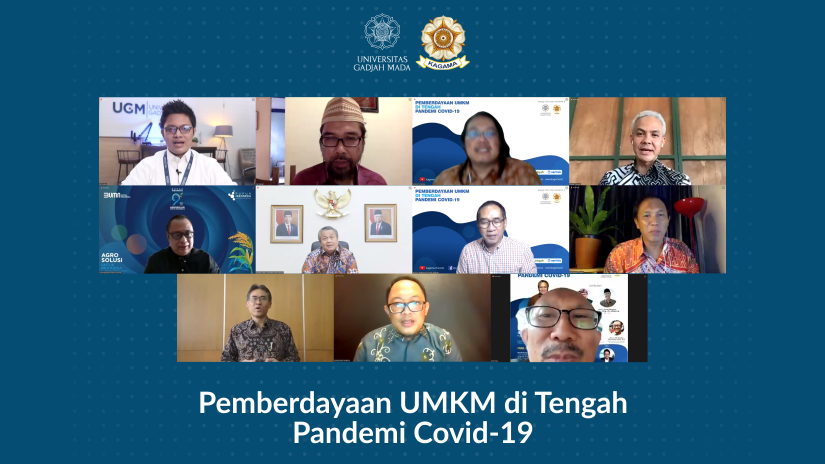
“MSMEs Empowerment during the Covid-19 Pandemic” was the theme of The Synergy of UGM and KAGAMA VI held on Sunday (4/10) via Zoom and live-streaming on the KAGAMA YouTube channel. The event discussed efforts to empower Micro, Small & Medium Enterprises (MSMEs) and increase public involvement, especially KAGAMA. In addition, the event was aimed to disseminate information about approaches to empower MSMEs at all levels of society.
Ganjar Pranowo, The Governor of Central Java and General Chairperson of PP KAGAMA, believed that Indonesian MSMEs have tremendous potentials. In addition, the role of the government, universities, and other stakeholders is vital, particularly for assisting MSMEs to penetrate the global market. Previously, Ganjar held the MSME Virtual Expo which aims to restore the morale of MSME actors by exhibiting or marketing their products. He also emphasized that experience and contributions, both from UGM, the government, and related institutions, are urgently needed to support our MSMEs in achieving their best quality.
Likewise, Secretary-General of PP KAGAMA, AAGN Ari Dwipayana, added that MSMEs are now the pillars of the Indonesian economy. Ari said that MSMEs absorb a large number of workers. Hence, government assistance, such as productive social assistance, should be pushed as the driving force for the MSMEs’ transformation to the next level.
“Our homework is still aplenty. For example, we need to help prepare our MSMEs to enter both national and international the supply chain,” he said.
Therefore, Ari continued, related parties must start the process from the mentoring, introduce MSMEs to digitalization and look for ways to integrate MSMEs with global chains through it. Of course, all affiliated parties, starting from the government, universities, surrounding communities, and MSME actors, must collaboratively empower MSMEs.
In this event, the Governor of Bank Indonesia, Perry Warjiyo, S.E., M.Sc., Ph.D., also spoke as a keynote speaker to discuss the empowerment of MSMEs.
“Synergy and collaborative work are the keys to continue developing MSMEs, especially for UGM alumni. Wherever they are, the blood of UGM alumni is the blood of the people’s economy,” remarked the chairman of KAFEGAMA.
Perry said there are four empowerment keys to boosting MSMEs quality. First is assistance—both technical and entrepreneurship assistance, and the formation of clusters. Second, the key is to facilitate both the traditional and online marketing of MSMEs. The third is digitizing. Digital platforms are useful for helping MSMEs connect to the marketplace. Fourth is access to financing both from banks and peer-to-peer (P2P) lending.
“Let’s strengthen our synergy and mutual cooperation to transform MSMEs into the pillars of the Indonesian economy,” he concluded.
The webinar, which was attended by more than 500 participants, featured two speakers who have long been involved in developing MSMEs. Cahyadi Joko Sukmono, S.IP., M.M., Chairman of ABDSI (Association of Business Development Services Indonesia), declared that during today’s pandemic, MSMEs are resilient forces; they are not always negatively affected because only MSMEs or businesses closely tied to pandemic restrictions were badly damaged during the Covid-19 lockdown. This is measured by market indicators and production.
Cahyadi also commented on the MSME Crisis Center, a multi-stakeholder collaborative organization that focuses on handling the impact of the COVID-19 pandemic on MSMEs and the local economy. MSME Crisis Center acts as a “Business Recovery Clinic,” which is positioned as a partner for businesses. The institution has spread across approximately 25 provinces, focusing on four core activities: a recovery plan consultation, incubation unit, mentoring, and intermediary action, which will eventually lead to achieving a ‘new normal’ restructuring. In addition, in the context of strengthening the ecosystem and economic recovery, there will still be opportunities even amid pandemic restrictions. With intensive collaborative efforts, an ecosystem that supports MSMEs will surely emerge.
The next speaker was Prof. Ir. Irfan Dwidya Prijambada, M.Eng., Ph.D., UGM Director of Community Service. Prof. Irfan explained how MSMEs’ main weakness is the lack of industrial culture in the work structure. However, in our current situation, we inevitably have to look for innovative ways to market MSME products as it greatly influences the development of MSMEs. At first, said Prof. Irfan, MSMEs should be trained to market their products differently from before. In the past, traders went directly to the market; now, they are assisted by online platforms. Apparently, many small MSME actors who are not familiar with the marketplace have started marketing their products through WhatsApp, and it has spread to become a new communication culture among small MSME actors. This particular culture has finally inspired a new culture of trade.
Another interesting point of the webinar was how agro-industrial products are being promoted and processed according to market needs—resulting in a wide variety of product development. Assisted by other parties such as the government and universities, MSME actors must be provided with new insight and skills so the quality of their products can meet the demand of national and international markets.
Through this webinar, all interested parties were expected to strengthen their synergy and empower Indonesian MSMEs so that MSMEs can transform into the pillars of Indonesian economy. Then, Indonesian products should soon reach the global market.
[Alumni Relations/Article:Winona, Photo: Maruf]
